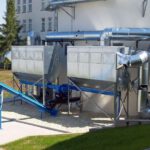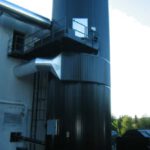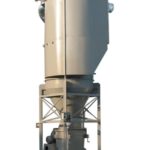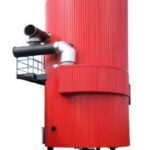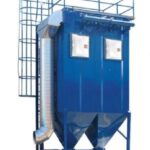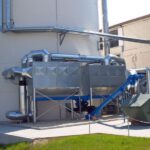Bag house filters in the energy and biomass industry
A compressed air cleaned bag house filter is a highly efficient dry filter system to purify air from suspended solids. In the energy and biomass industry, for example, bag house filters are used to clean flue gases. Often a reactent such as lime, sodium bicarbonate or activated carbon is added to the filter system. These substances adsorb or neutralize the harmful substances and are then collected all together in the bag house filter, thanks to micro-perforated textile bags supported by metal cages. The cages are attached to the filter housing and can be exchanged on the clean side at the top of the filter. The rectangular design of the installation allows the treatment of a wide range of pollutants and air volumes.
The aerodynamic filter inlet consists of a pre-chamber, which reduces the air velocity by widening and thus minimizes bag wear. A series of plates ensures that the larger coarse dust particles are separated immediately. Depending on the degree of contamination and particle size, a cyclone can also be used as a pre-separator. The air flow is distributed over the entire filter element surface and crosses it from outside to inside. Once filtered and cleaned, the air is transported to the filter outlet. The dust deposited on the external surface of the filter elements produces a uniform layer of dust that improves filtration efficiency. In order to achieve extra low dust emissions, the cartridge filter can be additionally equipped with a HEPA (H13) absolute filter. A bag house filter in the energy and biomass industry is therefore assembled and configured according to customer specific requirements.
The pressure drop will gradually increase due to the pollution, a sensor measures the differential pressure over the filter elements and controls the filter cleaning system. This periodic cleaning of the filter elements is done by a strong compressed air pulse, this way the differential pressure stays within the selected limits. This compressed air pulse cleaning system blows the bags clean from the inside out. As a result, less compressed air is consumed and the bags will last longer.
The biomass dust is separated from the filter element surface and falls by gravity to the bottom of the filter hopper where it is collected in a bin. This collection bin has to be emptied periodically. Depending on the application, the hopper at the bottom of the filter is equipped with a rotating sluice to continuously discharge the powder and for example to collect it in a big-bag. It is also possible to use a conveyor screw to continuously discharge the dust to a container.
An Air Solutions bag house filter is equipped with a high filter surface, is compact, easy to install, move and transport. Because in the energy and biomass processing industry a lot of work is done with explosive substances, our bag filters are also available in an ATEX version. The installation is then equipped with additional earthing lugs, anti-static filter bags, non-return valve, explosion vent panel and optionally a flame arrestor. It is also possible to equip the filters with an explosion suppression system. Explosion suppression is an active system that works with optical and pressure sensors, a control box and extinguishing units. In many cases where passive explosion protection does not succeed, this is possible with the HRD system. The HRD system can be used for explosion suppression and as an explosion barrier.
The complete housing of the filter can be executed in :
- Steel coated in the desired RAL colour
- Galvanized steel
- Stainless steel - AISI 304
- Stainless steel - AISI 316
Air Solutions Holland engineers, builds, assembles and carries out maintenance on static filters in the energy and biomass process industry varying in size from 2.000 to 200.000 m3/h. In addition to bag house filters, Air Solutions Holland also supplies compressed air cleanable cartridge filters and static filters:

ATEX

TUV

ISO

CE


